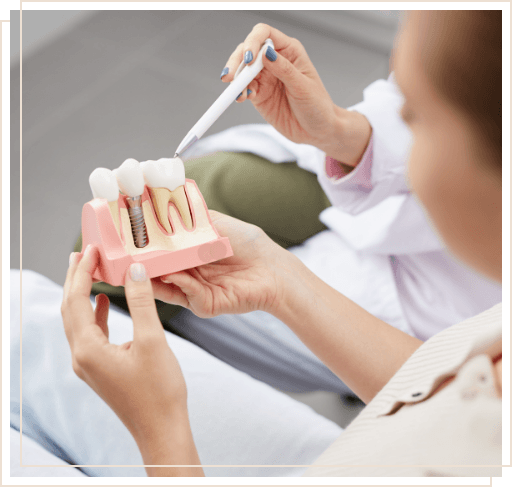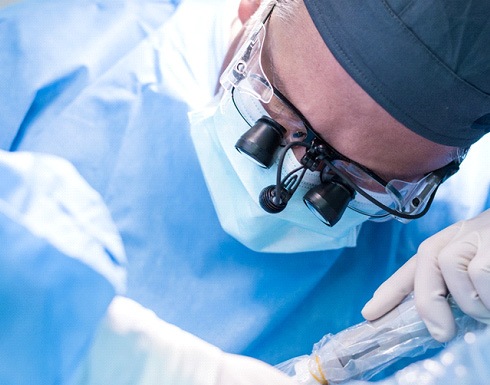Dental Implants – Morristown, NJ
A Top Choice for Replacing Missing Teeth

There’s more than one way to replace missing teeth, but if we find that you are eligible for dental implants, we are likely to recommend them first. The reason for that is simple: they can do many things that other traditional tooth replacements cannot. They offer better stability, tend to last longer, and can even prevent your jaw from losing bone tissue. Are you ready to rebuild your smile with dental implants? Give our dental office a call today; our team can figure out whether you’re a candidate for dental implants in Morristown and start putting together your treatment plan according to your needs.
Why Choose Skyline Dental of Morristown for Dental Implants?
- Dental Implants Placed In-Office
- Convenient On-Site Dental Lab
- Dental Team That Treats You Like Family
What Are Dental Implants?

Many dentists refer to dental implants as artificial tooth roots. Thanks to being surgically placed in your jaw, they are able to provide a level of stability that other tooth replacement methods can’t replicate. On top of that, dental implants function similarly to your natural teeth, being able to provide stimulation to keep the jawbone in good shape. The implant posts need to be placed in precisely the right spots, so the surgery must be planned very carefully.
The 4-Step Dental Implant Process

Compared to traditional tooth restoration solutions like dentures or bridges, the process of getting dental implants is a little more complex and lengthier. However, given all the impressive benefits that dental implants have to offer, going through this process is very worthwhile, especially when you consider the impressive longevity of dental implants. Our team would be happy to walk you through this process in detail so that you feel comfortable about rebuilding your smile and unlocking all of the advantages that implants have to offer. Here’s a brief overview of the four main steps that you can expect.
Initial Dental Implant Consultation

The process for getting dental implants begins with an initial consultation here at our office. During this visit, we’ll examine your mouth and facial structures to determine if dental implants are a viable option for you. Primarily, we’ll evaluate your jawbone density and review your medical history. Patients with insufficient bone density (which can occur following tooth loss) might need to undergo a supplemental graft beforehand. In other cases, periodontal therapy or tooth extractions might be necessary. Once we’re able to clear you for implants, we can schedule your appointment and provide you with an estimated cost and approximate timeline.
Dental Implant Surgery

We’re excited to offer in-house dental implant placement, meaning that we can complete the entire dental implant process in-house thanks to our skilled team! This also means that you won’t have to worry about scheduling outside visits to other offices, which will save you a great deal of time and effort. The procedure itself is surprisingly straightforward; first, we’ll thoroughly numb your mouth and ensure that you’re fully comfortable before getting started. Small incisions are made in the gum tissue to access the jawbone, and the implants are then placed! From there, it’s a matter of allowing the gum tissue to heal back up; the gums are sutured shut and protective caps are placed over the implant posts.
Dental Implant Osseointegration & Abutment

In order for your dental implants to serve you well, osseointegration must occur. This is the process where the dental implant posts fuse with the patient’s jawbone, and it’s arguably the single most important factor correlating to dental implant success since it provides the future replacement teeth with a sturdy foundation. On average, it takes anywhere from three to six months or so for this process to occur. However, it’s also heavily dependent on your compliance with recovery guidelines; while you can’t speed up the process, you can facilitate it! Once the posts have fused with your jaw, you’ll come back to receive abutments, which are small connector pieces that allow your final restoration(s) to sit in place.
Delivery of Dental Implant Restoration(s)

A few weeks following the placement of your abutments, you’ll come back for your final restorations. These replacement teeth will be designed based on precise impressions of your smile, so you won’t have to worry about unnatural-looking results, and they’ll function splendidly. Once they’ve been placed, we’ll ensure that your bite is correct and comfortable before sending you on your way with a complete and beautiful new smile!
Benefits of Dental Implants

When you choose to get dental implants, metal posts will be inserted into carefully chosen spots in your jawbone. These posts will mimic your natural tooth roots and provide support for a crown, bridge, or denture. Because they directly interface with your jaw, dental implants can provide a number of important advantages. If you’re interested in learning more on the topic prior to your consultation with our implant dentist in Morristown, then read on!
Day-to-Day Benefits

You may have heard that dental implants can improve your overall quality of life. How? Here are four examples:
- They won’t limit your diet – You’ll be able to eat all your favorite foods again since dental implants provide almost as much chewing power as real teeth.
- They look lifelike – Especially when they have been restored with a crown, bridge, or denture that was custom-made at our very own dental lab.
- They make speaking easy – Since dental implants are very stable, you won’t have to worry about slipping. Instead, you’ll be able to enunciate clearly!
- They are easy to maintain – Dental implants are very easy to take care of. Just implement good oral hygiene habits, like brushing and flossing consistently.
Health Benefits

Dental implants don’t just improve the look of your smile; they improve your oral health as well! Here are a few examples:
- They preserve your jawbone – Bone loss usually starts to occur when teeth are missing, but dental implants help encourage the growth of new bone tissue.
- They protect your natural teeth – Following tooth loss, dental drift can occur, which is when your teeth begin to shift into the open space. Since dental implants act as a placeholder, they also protect the alignment of your natural teeth.
- They benefit your overall health – Since tooth loss has been linked to several diseases, restoring the health and function of your smile with dental implants might improve your overall well-being as well.
Long-Term Benefits

One of the most noteworthy benefits of dental implants is that they have the potential to last a lifetime. Plus, they have an impressive 90% to 95% success rate even after a decade. That means that this state-of-the-art tooth-replacement solution can improve the look, health, and function of your smile in the short and long-term. Plus, they don’t require adjustments and replacements like dentures, so there’s a very good chance that it’s the most cost-effective option overall.
Who Dental Implants Can Help

You can get dental implants no matter how many teeth you’ve lost. Once we’ve examined your mouth, we can discuss the number of implant posts you’ll need and the type of restoration that will be attached to them.
Missing One
Tooth

We can insert a dental implant post into the gap left by a missing tooth without having to make any alterations to the nearby natural teeth. After the post has joined with the jawbone, we can restore it with a crown that has been made to look like a natural part of your smile.
Missing Multiple
Teeth

Dental bridges and partial dentures can both be used to replace multiple teeth at once, and in many cases, it’s possible to attach them to dental implant posts. The number of implant posts used depends on the situation; for example, only two posts are typically needed for a bridge.
Missing All of
Your Teeth

All you need to replace all of your missing teeth at once is a personalized full denture and four to six implant posts. Many patients find implant dentures to be more convenient than traditional ones since they don’t slip and can be brushed like regular teeth. On top of that, dental implants can help strengthen your bite, which means you will be able to enjoy more kinds of foods, including those that people with dentures often need to avoid.
Understanding the Cost of Dental Implants

The dental implant process has to be customized depending on the patient’s situation. In particular, the number of dental implants you get will vary depending on the extent of your tooth loss. As such, the cost of dental implants in your case won’t necessarily be the same as what another patient will have to pay. Since there are multiple variables that can affect the final price, you’ll only be able to get an accurate estimate once our team has finished examining your teeth.
While it’s true that dental implants usually cost more than other options, they also tend to last much longer thanks to their overall durability. This is a key point to keep in mind because while traditional bridges and dentures might have to be replaced after about 5 to 7 years, you can often keep dental implants for 30 years or more. In other words, you won’t need to pay for new dental implant posts nearly as often, making them a very wise investment in many cases.
Dental Implants Post-Op Instructions

Before you leave our office after the placement procedure, we’ll give you personalized instructions that you’ll need to follow if you want the healing process to go smoothly. The most important thing to keep in mind is that the surgical site must develop a clot over it. Without this clot, bacteria can infect the sensitive tissues underneath the gums. If you ever have questions or concerns, don’t hesitate to reach out to us for guidance.
What to Do Directly After Dental Implant Surgery
From the moment you leave our office, you should head home to rest for a few days. After all, you’ve just undergone a surgical procedure, even if it’s minor. You’ll need that time to take it easy and allow your mouth to do quite a bit of healing. In fact, you should refrain from strenuous activities for at least 48 hours.
Common Side Effects When Recovering from Dental Implant Placement
After the anesthesia wears off from the surgery, you may experience certain symptoms that may be unpleasant but aren’t alarming. For instance, the site may bleed on and off for an hour or two after you get home. Make sure you have clean gauze in your mouth, so you know how much bleeding you have, which should taper off. You may also feel sore or uncomfortable. Over-the-counter pain reliever should be enough to manage the pain—along with a cold compress on your face. If the pain increases or is accompanied by a fever, give us a call.
Your Diet After Dental Implant Surgery
For the first 48 hours, you should limit your food intake to soft and liquid foods, such as applesauce, gelatin, eggs, yogurt, and the like. However, do not use a straw to drink or have a smoothie because the sucking motion can dislodge the blood clot, potentially leading to an infection. After a few days, you can slowly start to reintroduce more normal foods to your diet. Be careful with eating chips and other hard, crunchy foods and try to avoid using that area of your mouth.
Post-Op Health & Oral Hygiene
Keeping up your strength is going to help you recover smoothly from the implant placement procedure. Nutritious foods, such as those that have high Vitamin C content, will help your body bounce back and fight infection.
Equally as important, keep your mouth clean so that oral bacteria don’t have the chance to infect your gums or teeth while they’re vulnerable. As a result, you should continue to brush and floss about 24 hours after the surgery—just be super gentle and careful around the surgical site to not disrupt the clot.
What to Do After Your New Teeth Are Attached
Later, when the restorations are bonded to your implants, it may take a little bit of time to adjust to having a complete set of teeth. For a few days, your gums may feel sensitive, but if you notice bleeding or swelling, call us right away. Otherwise, you can start to enjoy your smile again!
Maintaining & Caring for Your Dental Implants

Titanium posts and ceramic restorations won’t decay, but oral bacteria can still affect dental implants. After all, your gum tissue can still become infected, which means you’ll need to keep your implants clean and in good working condition. One of the most amazing things about dental implants is that they come so close to your natural teeth that you can treat them just like teeth. If you follow these basic maintenance tips, your dental implants can last for decades!
Make Oral Hygiene a Priority

To prevent peri-implantitis, an infection that causes implant failure, you need to brush and floss your teeth every day. Making these tasks daily habits will stop bacteria-filled plaque from building up on your prosthetic teeth and allow your gums to remain pink and firm.
Eat a Healthy Diet

Did you know that nasty oral bacteria love sugar and starch? They thrive on the bits of food and fluid in your mouth, but if you limit how much sugar you eat or drink, you can control their growth. As a result, they have a limited impact on your restored smile. On top of a balanced, nutritious diet, you should also make sure you drink plenty of water throughout the day because water can rinse debris and bacteria out of your mouth and keep it properly hydrated.
Break Bad Habits

You may have picked up a few unhealthy habits over the years, but some of them can be damaging to your implants. For instance, smoking or vaping encourages bacterial growth in the mouth, increasing the chances peri-implantitis. Now is the best time to end these kinds of habits and extend the lifespan of your implants.
Protect Your Dental Implants

Although dental implants consist of extremely durable materials, your jawbone and gum tissue are not indestructible. If you grind your teeth while you sleep or get hit in the face while playing contact sports, you could suffer implant failure. It would be a good idea to have a mouthguard to take pressure or an impact off your teeth.
Schedule Regular Dental Checkups

For the most part, dental implant failure happens over time, not suddenly without warning, but you need to know what to look for. Fortunately, Dr. Henkin can keep a close eye on your implants and make sure your mouth stays healthy and strong. Regular checkups will give us a chance to catch issues before they put your implants at risk of failure.
Dental Implant FAQs

Does Getting Dental Implants Hurt?
Firstly, our team will always ensure to numb the area we’ll be working around with a local anesthetic so that you can remain pain-free throughout your procedure. Additionally, the jawbone doesn’t have many nerve endings, meaning you likely won’t experience much discomfort during or after your visit. Although you shouldn’t feel pain during, it is normal for patients to experience some soreness or discomfort for a few days after. Fortunately, you can manage this simply by using a cold compress to reduce swelling and taking painkillers (prescribed or OTC) to alleviate any aches. If you notice any unusual symptoms or discomfort that worsens after two or three days, notify us right away for help.
How Long Do Dental Implants Last?
Due to their design, biocompatibility, and effectiveness, dental implants can often last several decades to even the rest of your life! That said, their longevity depends heavily on your lifestyle and how well you take care of them. This means you’ll want to implement certain measures to ensure they stay healthy for as long as possible. If you want to make the most of your new pearly whites, be sure to practice great oral hygiene every day, including brushing, flossing, and rinsing with mouthwash frequently. Don’t forget to visit your dentist every six months for checkups and cleanings, that way they can address any underlying issues before they can grow. Try not to chew on anything particularly sticky or hard, and don’t use your teeth as tools.
Am I Too Young to Get Dental Implants?
Fun fact: most people’s jaws don’t become fully mature until they’re young adults. In some cases, a person’s jaw might take until their mid-20s to completely develop. If you try to get dental implants before your jawbone has matured, they can end up disrupting the rest of your bone development and may lead to certain complications. For this reason, most dentists who offer dental implants won’t place them in patients who are younger than 18 years old. Additionally, men’s jaws tend to take longer to develop compared to women’s jaws.
What Can Cause Dental Implants to Fail?
There are generally two major culprits of dental implant failure: failed osseointegration and peri-implantitis. From the start of the treatment, the titanium posts will need to be placed in the jawbone and integrated with the tissue to remain permanently in place. If a patient has low jawbone density, the implant can end up at risk of falling out or failing. Peri-implantitis is a form of periodontal disease, usually due to poor oral hygiene, that can harm the gums and bone tissue keeping the implant in place. These titanium posts can also fail due to chronic teeth grinding, certain medications, tobacco use, and certain health conditions (cancer, diabetes, osteoporosis, etc.). Our team will be sure to provide specific instructions on how to significantly reduce your risk of dental implant failure.
